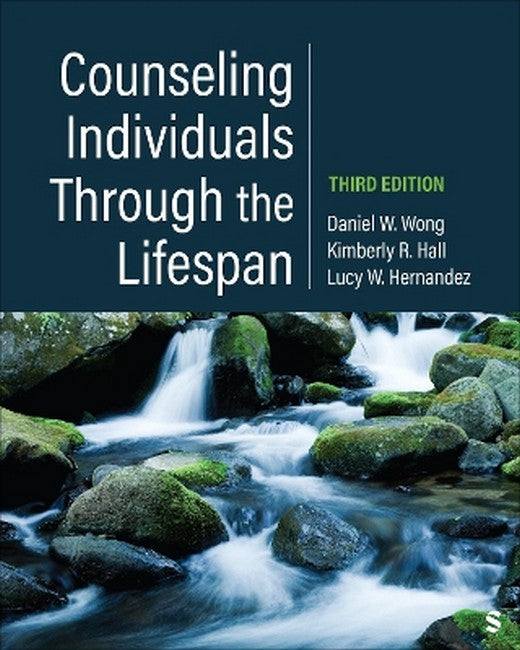Daniel W. Wong, Ph.D., is a Professor Emeritus of Mississippi State University (MSU). Prior to MSU, Dr. Wong was Professor and Director of the Doctoral Program in the Department of Rehabilitation Studies, College of Allied Health Sciences and Adjunct Professor in the Department of Physical Medicine and Rehabilitation at Brody School of Medicine at East Carolina University. Since 1987, he has taught at the University of North Texas, San Jose State University, Hofstra University, and the University of Hawaii at Manoa. Dr. Wong received the American Counseling Association (ACA) Research Award and the American Rehabilitation Counseling Association Research Award and he has published more than 80 peer reviewed articles, book chapters, and numerous disability-rehabilitation policy/position papers nationally and internationally. Kimberly R. Hall earned a master's of science degree in School Counseling in 1997 and the doctorate of philosophy degree in school counseling in 2004 from Mississippi State University. Dr. Hall worked at Virginia Commonwealth University in Richmond, Virginia exclusively with the school counseling program for several years before returning to Mississippi State. For six years, she served as the Program Coordinator for Graduate Programs in School Counseling which offered degrees at the master's, educational specialist, and doctoral degree levels. She is now an Associate Professor at the Meridian campus of Mississippi State University and currently serves as the Program Coordinator for Graduate Programs in School Counseling and as Graduate Coordinator for the Division of Education. Dr. Hall specializes in counseling children and adolescents and working with parents. Lucy Wong Hernandez, M.S. is an instructor in the Department of Counseling and Educational Psychology at Mississippi State University. She has extensive experience in the fields of rehabilitation and disability studies as they relate to academics, disability rights, social policy and service provision for persons with disabilities. She teaches in the areas of rehabilitation counseling and disability, gerontology, and human development. She is a frequent speaker, presenter, and trainer at national and international conferences and seminars. She has authored and contributed to numerous articles on disability rights, social policy, and multicultural issues. She has taught at York College - City University of New York, Hofstra University, University of Hawaii at Manoa, and East Carolina University.
Request Academic Copy
Please copy the ISBN for submitting review copy form
Description
Preface Acknowledgments About the Authors Part I: Chapter 1: Human Development Through the Lifespan Why is Studying Human Development So Important? The Future of Artificially Intelligence (AI) Climate Change The Counseling Connection The Complexity of Human Development Life Domains of Human Development A Biopsychosocial Approach Human Development Knowledge Applied to Counseling Summary Additional Resources Recommended Supplemental Readings References Chapter 2: Theories of Human Development Theories and Theoretical Models of Human Development Cultural Diversity and Human Development Seeking the Truth: Research Methodologies Rules Governing Human Subjects Research Research Contributing to a Counselor's Identity Summary Additional Resources Recommended Supplemental Readings References Part II: Chapter 3: Conception and Prenatal Development Healthy Prenatal Development Risks to Healthy Prenatal Development Counseling Issues Summary Additional Resources Recommended Supplemental Readings References Chapter 4: Infancy (Birth to 12 Months Old) Healthy Infant Development Counseling Issues Summary Additional Resources Recommended Supplemental Readings References Chapter 5: Toddlerhood (Ages 1 to 3) Healthy Toddler Development Risks to Healthy Toddler Development Counseling Issues Summary Additional Resources Recommended Supplemental Readings References Chapter 6: Preschool: Early School Age (Ages 4 to 5) Healthy Preschool Development Risks to Healthy Preschool Development Counseling Issues Summary Additional Resources Recommended Supplemental Readings References Chapter 7: Middle Childhood (Ages 6 to 12) Healthy Middle Childhood Development Cognitive Development Social Development Emotional Development Counseling Issues Cultural Diversity A Time of Wonder Summary Additional Resources Recommended Supplemental Readings References Part III: Chapter 8: Early Adolescence (Ages 11 to 15) Healthy Early Adolescence Development Self-Concept and Self-Esteem in Early Adolescence Counseling Issues Current Counseling Trends Cultural Diversity A Time of Stress and Adaptation, as well as Wonder and Awe Summary Additional Resources Recommended Supplemental Readings References Chapter 9: Late Adolescence (Ages 16 to 19) Healthy Late Adolescence Development Emotional and Social Development Alcohol and Drug Use College: A Unique Arena for Emerging Adulthood College: Choosing Not to Go to College and Returning Home After College Counseling Issues Cultural Diversity Summary Additional Resources Recommended Supplemental Readings References Chapter 10: Emerging Adulthood (Ages 20 to 29) Healthy Emerging Adulthood Development Risks to Healthy Development During Emerging Adulthood Counseling Issues Conclusion Summary Additional Resources Recommended Supplemental Readings References Chapter 11: Middle Adulthood (Ages 30 to 65) A Period of Recent Recognition Changes in Middle Adulthood Midlife Crisis or Midlife Transition Generativity Versus Stagnation Person-Environment, Culture Interaction, and Socioeconomic Status Counseling Issues Summary Additional Resources Recommended Supplemental Readings References Part IV: Chapter 12: Late Adulthood (Ages 66 to 75) Responding to the Counseling Needs of a Growing Aging Population The Aging Process Aging: A Natural Transition and a Factor in Counseling Counseling Clients in Late Adulthood Summary Additional Resources Recommended Supplemental Readings References Chapter 13: Oldest-Old Elderhood (Ages 76 and Older) A New Era and a New Approach for the Oldest-Old Elderhood Understanding Quality of Life and Life Satisfaction in Old Age Adjustment to Advanced Aging Emotional Impact of Chronic Illness and Disability Psychosocial Crisis Gerontological Counseling Expertise Cultural Competence Summary Additional Resources Recommended Supplemental Readings References Epilogue: From the Author's Chair Matrix of Core Curricular Experiences Glossary

